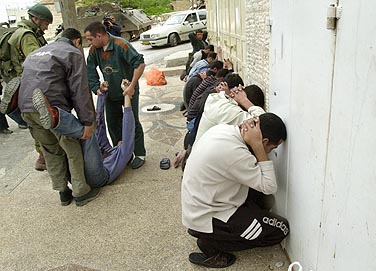Being a teacher is really quite a privilege. To start, you have an entire hour or hour and a half to talk to a captive audience. They have to listen to you, and they can only disagree if you let them. Really, education could easily be called indoctrination, for sometimes it actually feels like brainwashing. And I think that it can be brainwashing. Students are trained to take their teachers' words as gold, and I think we have a responsibility to retrain them to not just ingest but to challenge. To challenge everything.
I always say that I don't understand why Israel won't give me a visa if I say I live in Palestine. I mean, I am NOT DOING ANYTHING WRONG! I'm teaching writing for god's sake! I gave a lecture this week that woke me up to the reality that for Israel, I am doing something very dangerous. I am inciting my captive audience.
My students are learning about collective memory--that lived experience that is shared by many and articulated by individuals of that collective. Collective memory informs the historical record, and the historical record constitutes the accepted version of the past and the present. Well, as we know from Palestine and Israel, the historical record is a Zionist history, much of which is based on myths and all of which is used to facilitate a colonialist project. Collective memory is a powerful tool...but only if articulated, accessed, and embraced.
Let's think about 1948 in Palestine. Israel's "Independence" is celebrated extensively and globally. On this 60th anniversary, let us really think about Israeli independence. The small but determined army of Jews defended themselves against the overwhelming Arab armies. "Never again," they shouted--a clear reference to the Holocaust and exile. End of story. Israeli collective memory of 1948 paints a triumphant, nationalist picture of success against great odds. And the national imaginary and historical record are wholly based on this experience, but the less referenced historical record shows Ben Gurion, the Zionist leader at the time, knowing that they were neither outnumbered nor overpowered, and certainly not threatened existentially. Yet he and his power dogs claimed otherwise, and Jews fought on this basis. So it is their collective memory which has in turn written history.
Where is the story of the Nakba? Few hear that story of Palestinians in 1948, though this is beginning. Where is their collective memory? It has certainly not shaped the historical record in any significant way to date. What does that mean? What I told my students, and what Said articulates, is that the Palestinian failure to consolidate their collective memory of the Nabka and shape it into a coherent narrative that is accepted as historical record is absolutely detrimental to the cause of Palestine.
Israel is ethnically cleansing Palestinians. It is a 60 plus year campaign, one that morphs but whose goal is steadfast. The Zionist Project will succeed, and there will be no Palestinians.
The future of the Palestinian people depends on their ability to harness collective memory and demand a new narrative that includes them and their experiences. For as long as the world knows only the Zionist history, Israel's "security measures"--read occupation and ethnic cleansing--are wholly justified. NO! There is a history of occupation and oppression here and I must believe the world would not condone Israeli state terror and ethnic cleansing and apartheid if the world really understood. But how can it? The Palestinians are silent; they are silenced. It is terribly easy to cleanse the silent / silenced from the land. And so I say: assert the collective memory and claim it as part of a history that the world must learn. Gather it and insert it into the historical record, because it is valid. But do it now, before it's too late.
Friday, September 12, 2008
The Privilege of Teaching
Labels:
apartheid,
ethnic cleansing,
israel,
occupation,
palestine,
zionism
Subscribe to:
Post Comments (Atom)








1 comment:
A great, great blog entry. May your students learn well from you, O Teacher, and may they apply their learning well! Vive Palestine!
Post a Comment